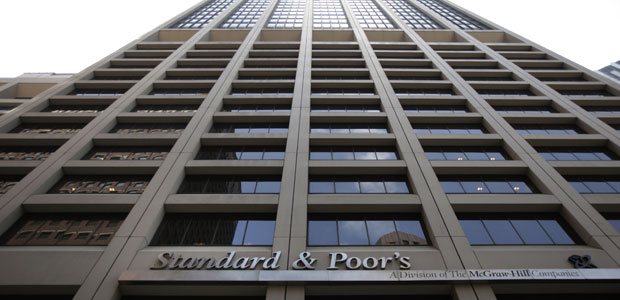Eurozone downgrade threat – investors respond
As a ratings agency threatens to downgrade not only France and Germany but the eurozone bailout fund itself, Channel 4 News looks at how investors are reacting and what it could mean.
The decision by Standard and Poor’s (S&P) means six countries with the top AAA credit rating, including France and Germany, have a 50 per cent chance of being downgraded in the next three months.
S&P went further on Tuesday, threatening to downgrade the European Financial Stability Facility itself, used so far to bail out Ireland, Portugal and Greece.
The markets appear to have taken the announcements in their stride, but revised credit ratings have implications for countries’ borrowing costs and the willingness of investors to buy their bonds.
Channel 4 News has spoken to two big investment firms, Legal and General (L&G) and Standard Life Investments (SL), and a stockbroker to gauge reaction and consider what the threats actually mean for the survival of the eurozone.
AAA funds
L&G and SL have agreements with some clients that a proportion of their investments will be held in AAA-rated (comparatively safe) funds. If government bonds, issued by individual countries to raise money, are downgraded, investors may come under pressure to sell those bonds.
Georg Grodzki, L&G’s head of credit research, said: “It’s possible that a rating announcement can result in a bond disposal. We would not necessarily share what Standard and Poor’s has done, but would partially agree that some countries are looking in danger in terms of credit quality.”
Each fund manager has to take a view, but we are more likely to be sellers than buyers. Georg Grodzki, Legal & General
Mr Grodzki said if S&P decided to revise eurozone countries’ ratings, “each fund manager has to take a view, but we are more likely to be sellers than buyers”.
He added: “It depends on the mandate how much leeway we have. It also depends on price levels. It could result in a decision with the client on the best exit strategy and that may not be an immediate sale. This could be one of those situations.
“Ratings agencies have lost a bit of their reputation in the last few years, and it’s possible that future mandates will be written without ratings preferences, without being trapped in these investments and then being forced to sell at the time of a downgrade.”
Significant threat
Paul Kavanagh, a partner at Killik & Co stockbrokers, said that although the markets had not learned much from S&P’s analysis, the threat of a downgrade was significant.
“It clearly does matter because if you lose the AAA risk-free rate of return, you’re on a slope that starts with an avalanche and you don’t know when it’s going to end,” he said.
You’re on a slope that starts with an avalanche and you don’t know when it’s going to end. Paul Kavanagh, Killik & Co
S&P’s announcement was made just hours after German Chancellor Angela Merkel and French President Nicolas Sarkozy unveiled proposals for a new European treaty with budgetary discipline at its heart. The proposals will be discussed at a European summit on Friday – although UK Prime Minister David Cameron is threatening to throw a further spanner in the works then as well.
On the downgrades, Mr Kavanagh said: “I’m not surprised, although the timing could have been better. It felt like the timing was there to spoil what was built up to be a bit of a party. “To some extents, the markets have got their first. They had already priced this in and seen it coming.”
Standard Life has £157bn invested, much of this is in government bonds. Frances Hudson, global strategist at Standard Life Investments, said the company only had “a light weighting in European government bonds”, but a “heavy weighting”in British gilts.
‘Weighted average’
Like L&G, if bonds or other investments are downgraded by one ratings agency, SL takes a “weighted average” of what all the agencies are recommending before making a decision.
Ms Hudson said: “Any major institution like Standard Life will do its own assessments of the situation with corporate credit or sovereign credit. We have plenty of people who sit and look at what companies and sovereigns (countries) are doing. If you have a mandate to just invest in AAAs, it matters.”
She said S&P wanted eurozone governments to go further in reducing their debts.
“Standard and Poor’s say they’re trying to add pressure to eurozone ministers to take decisive action this weekend,” she said.

S&P's 2011
In April, Standard and Poor's was criticised by the Obama administration after it downgraded America's credit rating. The US government accused S&P of getting its figures wrong by $2tr. S&P disputes this.
In August, the US Justice Department launched an investigation into the company, reportedlly to look at claims that the agency had over-estimated the credit worthiness of mortgage securities in the run-up to the 2008 global financial crisis.
S&P has been accused of failing to foresee the steep decline in the housing market and the lending squeeze, the origin of the credit crunch. It has admitted that "a number of the assumptions we used in our analysis of many recent American consolidated debt obligations did not hold up".
-
Latest news
-
Tim Booth of the band James’ on agism in music, topping the charts and AI6m

-
As India goes to the polls in the world’s largest election – what do British-Indians think?6m

-
Tees Valley: Meet the candidates in one of the biggest contests coming up in May’s local elections4m

-
Keir Starmer says public sector reform will be a struggle7m

-
Nicola Sturgeon’s husband Peter Murrell charged with embezzlement of funds from SNP1m

-




